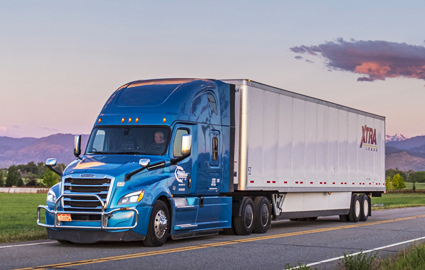
Buying vs. Leasing Trailers: Advantages of Each
Risks in trucking never go away.
Which fits your business best?
Weigh the benefits of buying vs leasing trailers.
That’s life in trucking. Those risks never go away. The stakes are especially high today in light of rising equipment prices, a shortage of drivers, a glut of expensive regulations and the threat of recession. You have to stop and take a breath every now and then. Think about how you want to improve your business. Weigh the benefits and drawbacks of buying or leasing trailers.
Which of those options for adding trailers to your operation fits your business best?
Maybe you’re a staunch I’m-gonna-own-all-my-trailers kind of manager. And maybe a large fleet of owned assets fits your business model.
But maybe there’s room in your plan for a lease.
You’re probably thinking, “Big surprise. XTRA Lease thinks I should lease instead of buy.”
Sure, our company wants to lease trailers, but here’s why we want you to consider leasing some instead of buying all:
Customers tell us that most effective fleets have a combination of leased, owned, and rented trailers.
Only you know what the best mix is for YOUR business. Comparing the benefits and drawbacks of buying vs leasing trailers can help you make the best decisions.
This table lays out some key advantages of both so you can easily compare. Download a PDF version of the table here.
ADVANTAGES OF LEASING | ADVANTAGES OF OWNING | |
Conserve capital.That’s the thing about capital—no matter how flush you are, your supply of cash is finite. Do you want to use that cash for a down payment? Or do you want to use it to grow your business? Reduce maintenance costs.You own it, you maintain it. You don’t own it…Many leasing companies let you tailor maintenance programs to meet your needs—and they handle preventive maintenance for you. Your lessor can negotiate sensible prices with repair vendors and deal with the tight market for mechanics while you keep the freight moving. (Most leases come with emergency road service, too, so that’s another headache you can avoid.) Boost productivity.With leases, you can get the newest, most efficient equipment—can you say “less downtime”? And you can offload costly administrative chores because your leasing company takes on the time and expense of handling taxes, licenses and regulatory compliance. Improve your flexibility.Leasing gives you quick access to the trailers you need to match your customer’s requirements, without having to hang on to those assets long-term. Avoid risk.What happens when your trailers age out of service or become obsolete? (Remember the 40’ trailer?) You have to dispose of them. So now you’re in the used trailer business. Fun. But when you lease, selling equipment is your
leasing company’s problem, not yours. And leasing takes the risk out of vetting new stuff, so you can use the latest technology without making a permanent commitment to it.
| Improve your tax situation.Trailers you buy become assets on your balance sheet immediately. If your business has plenty of cash and little risk of a tax operating loss, then owning trailers lets you take a deduction for depreciation. Improve your financing options.You may be able to take advantage of tax oriented financing. It may be beneficial to your business to choose a financing plan that trades immediate tax benefits for lower financing payments or renew-or-walk flexibility. Get easier financing.Rather than negotiate with a lender or use an existing credit line that encumbers the title, you might be able to buy a new trailer via a purchase-option lease from a supplier (your leasing company, maybe?) Have full control.Sometimes you just want to be the owner. The only thing that’ll scratch that itch is putting cold, hard cash on the counter, then hooking up your newly purchased 53-footer and hauling it home.
|
Here are a few more takes on the buying vs leasing question. Why not check them out?